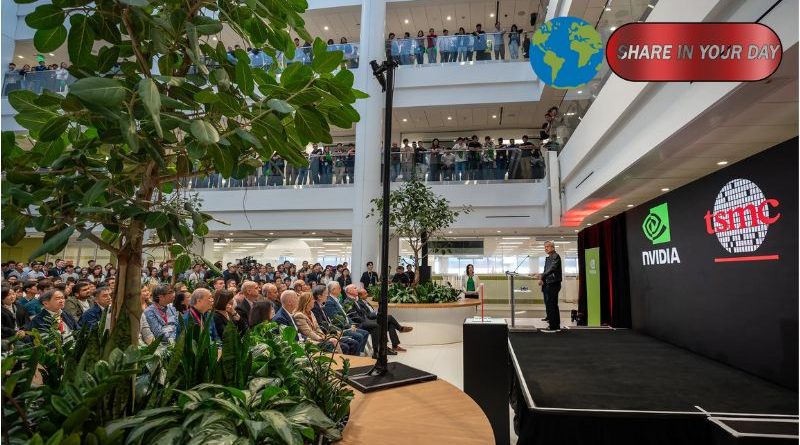Nvidia and TSMC Reveal First U.S.-Made Blackwell Chip Wafer in Major AI Milestone
Phoenix, AZ — In a landmark development for the U.S. semiconductor and artificial intelligence (AI) industries, Nvidia and Taiwan Semiconductor Manufacturing Company (TSMC) have unveiled their first U.S.-produced chip wafer for Nvidia’s next-generation Blackwell AI chips.

Announced during a visit by Nvidia CEO Jensen Huang to TSMC’s advanced manufacturing facility in Phoenix, Arizona, the event marks a pivotal step in reshoring critical technology production to American soil.
🇺🇸 A Vision Coming to Life
“This is historic,” Huang told hundreds of TSMC workers gathered at the site on Friday. “You built something incredible — and you are part of something much bigger.”
The Blackwell chips, central to Nvidia’s roadmap for powering AI data centers, represent some of the most sophisticated hardware in development today. With the first U.S.-made wafer now completed, production has entered a new era, both symbolically and strategically.
“The single most important chip is now being produced in America,” Huang declared.
🔧 Building America’s AI Factories
The announcement reflects growing efforts by Nvidia and TSMC to shift essential semiconductor infrastructure back to the United States. In a joint statement, the companies emphasized their role in building the foundation for America’s AI economy, describing the Arizona facility as a hub for innovation that will create thousands of high-tech jobs.
“TSMC Arizona is expected to attract a wide ecosystem of suppliers and create long-term economic impact,” the statement read.
💬 Huang Credits Trump’s Manufacturing Push
In a surprising twist, Huang credited former President Donald Trump for initiating the reshoring movement, which he said was key to enabling Friday’s announcement.
“President Trump had the vision to bring this capability back to the U.S.,” Huang said, echoing sentiments multiple times during the event. “This is just the beginning.”
The TSMC facility in Arizona is one of several major projects boosted by incentives under the CHIPS and Science Act — a bipartisan effort to revive American chip production and reduce dependency on Asian supply chains.
💡 A Strategic Investment
Nvidia’s commitment to domestic infrastructure is more than symbolic. Huang revealed that the company plans to invest over $500 billion in AI-related infrastructure over the coming years — much of it within the U.S.
“This is how we lay the groundwork for the United States to lead the AI race — not just in research, but at the infrastructure level,” Huang told the crowd.
The Blackwell chip is a cornerstone of that vision, expected to power the next generation of AI training and inference systems across data centers globally.
⚠️ A Long Road Ahead
While the announcement represents a major milestone, experts caution that the journey toward full supply chain independence is far from over. U.S. chip demand still heavily relies on components and manufacturing expertise from overseas, particularly in Asia.
However, today’s wafer — though just a first step — signals tangible progress.
📉 The Bigger Picture
The global AI race is increasingly about who controls the physical infrastructure, not just the algorithms. Nations are competing not only to develop AI, but to manufacture the hardware that makes it possible. Friday’s development underscores the high-stakes nature of this technological arms race.
“We are building the infrastructure of the new industrial revolution,” Huang said. “And it’s happening here, in the United States.”
Published by: kilatnews.id
Category: Tech / Business / AI / Semiconductor
Tags: #Nvidia #TSMC #BlackwellChip #TSMCAZ #AIChips #MadeInUSA #SemiconductorNews #JensenHuang




